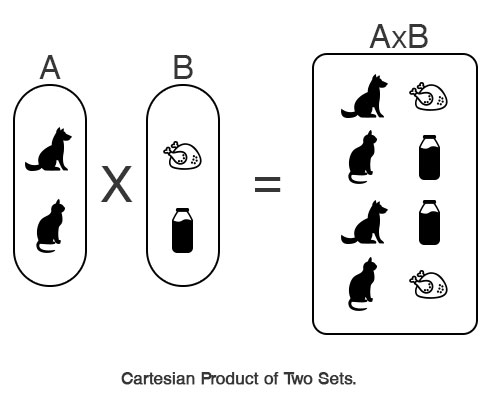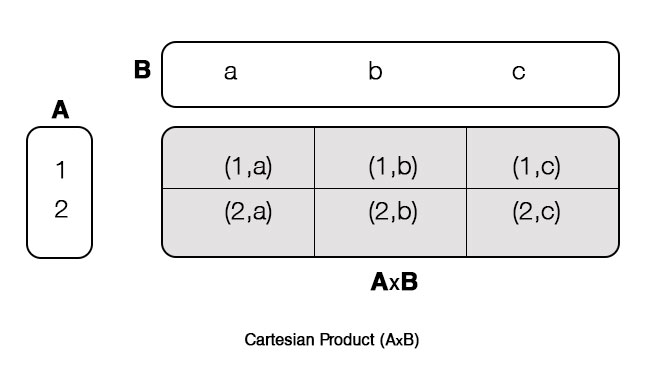For two sets A and B, the Cartesian product of A and B is denoted by A×B and defined as:
A×B = { (a,b) | aϵA and bϵB }
Cartesian Product is the multiplication of two sets to form the set of all ordered pairs. The first element of the ordered pair belong to first set and second pair belong the second set. For an example,
Suppose, A = {dog, cat}
B = {meat, milk} then,
A×B = {(dog,meat), (cat,milk), (dog,milk), (cat,meat)}

Here, set A and B is multiplied to get Cartesian product A×B. The first element of A×B is a ordered pair (dog, meat) where dog belongs to set A. Similarly, second element of the ordered pair, meat belongs to set B. This is true for all elements(ordered pair) of A×B.
Cartesian Product Examples
Example #1: Practical Example on Cartesian Product
If X be the set of points on x-plane and Y be the set of points on y-plane then, X×Y represents the on XY plane.
Example #2
Suppose two sets A = {a, b} and B = {1, 2, 3}. Find A×B and B×A.
Here,
A = {a, b}
B = {1, 2, 3}
Now,
A×B = {(a,1), (a,2), (a,3), (b,1), (b,2), (b,3)}
B×A = {(1,a), (1,b), (2,a),(2,b), (3,a), (3,b)}

Example #3
If A×B = { (x,1), (x,2), (x,3),(y,1), (y,2), (y,3)}. Find A and B.
Since, set A contains first element of each ordered pair only,
A = {x, y}
Since, set B contain second element of ordered pair only,
B = {1, 2, 3}
We exclude duplicate elements in both sets (because, set can only contain unique element).
Cartesian Product of 3 Sets
For three sets A, B and C, the Cartesian product of A, B and C is denoted by A×B×C and defined as:
A×B×C = { (p, q, r) | pϵA and qϵB and rϵC }
Example #4
Suppose two sets A = {-1, -2}, B = {1, 2} and C= {0}. Find A×B×C.
Here,
A = {-1, -2}
B = {1, 2}
C = {0}
Now,
A×B = {(-1,1,0), (-1,2,0), (-2,1,0), (-2,2,0)}
Key Points on Cartesian Product
Cartesian Product of Empty Set
If either of two set is empty, the Cartesian product of those two set is also an empty.
If A = {1, 2} and B = ϕ. Then, A×B = ϕ and B×A = ϕ.
Non-commutativity Property
For two unique and non-empty sets A and B, A×B is not equal to B×A.
If A = {a, b} and B = {1, 2, 3} then,
A×B = {(a,1), (a,2), (a,3), (b,1), (b,2), (b,3)}
B×A = {(1,a), (1,b), (2,a),(2,b), (3,a), (3,b)}
Here, A×B ≠ B×A
Condition for Commutative Property
For two sets A and B, the Cartesian product of two sets A×B and B×A are equal if either of the following condition is satisfied:
- either of two set is empty
- both sets are equal
If A = {1, 2} and B = ϕ. Then,
A×B = ϕ
B×A = ϕ
Hence, A×B = B×A
If A = B = {1, 2} then,
A×B = {(1,2), (2,2), (2,1), (2,2)}
B×A = {(1,2), (2,2), (2,1), (2,2)}
A×A = A2 = {(1,2), (2,2), (2,1), (2,2)}
B×B = B2 ={(1,2), (2,2), (2,1), (2,2)}
Hence, A×B = B×A = A2 = B2